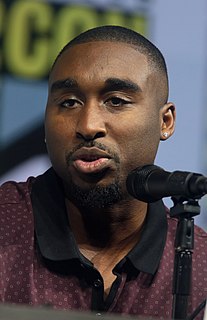A Quote by Michael Eric Dyson
Body piercing and baggy clothes express identity among black youth, and not just beginning with hip-hop culture. Moreover, young black entrepreneurs like Sean 'P. Diddy' Combs and Russell Simmons have made millions from their clothing lines.
Related Quotes
Music is one of those businesses in which, if you're talented and hustle hard enough, you can make it - specifically as an entrepreneur. If you look as far back as Berry Gordy, Russell Simmons, Andre Harrell, L.A. Reid, and Sean 'Diddy' Combs, there's a whole lineage of successful black entrepreneurs who have built their own companies from scratch.
This is more in regards to celebrities. What we've got to understand is that we are the influencers of the hip-hop culture, the black culture. We are the way out, you feel what I'm sayin'? As far as who we look to and where we get stuff from - hip-hop culture is influencing the world, really, but especially the black communities.
Few places in American culture have made as effective a case for entrepreneurship than hip-hop. Hip-hop tells young people that our society is offering very limited options for youth. And that while society points to a radical decline in living wage jobs for youth and meaningful and affordable education, hip-hop is offering an alternative legitimate economy that is giving youth hope.
I am trying to get folks outside the hip-hop culture to understand why, despite the negatives, young people find hope and refuge in hip-hop. I'm hoping that young people immersed in the culture will work harder to capitalize on the possibilities for great social change that hip-hop represents as a national unified cultural youth movement.
I think that hip-hop should be spelled with a capital "H," and as one word. It's the name of our black people culture, and it's the name of our identity and consciousness. I think hip-hop is not a product, but a culture. I think rap is a product, but when hip-hop becomes a product, that's slavery, because you're talking about people's souls. To me, that's the biggest problem.
I never hated hip-hop. It became the new rock and roll. It became the biggest thing that Africans have ever done in the history of the Americas. Hip-hop put more black Americans on than anything before it. It fed more people. It allowed them to diversify into clothing lines and billion-dollar headphone companies.
There are many things that black women can continue to do to help black folk. First, black women have historically been among the most vocal advocates for equality in our community. We must take full advantage of such courage by continuing to combat the sexism in our communities. Black women, whether in church, or hip-hop, don't receive their just due. Second, when black women are in charge of child-rearing, they must make ever so sure to raise black children who respect both men and women, and who root out the malevolent beliefs about women that shatter our culture.
I remember like that scene with Pharrell where they're at the music video shoot, we have this on camera actually, Pharrell's confused because we weren't doing the script. We were doing all this improv and then Diddy says to him... Pharrell's like I don't understand what's going on and Diddy goes, "We do a lot of improv". (laughter) I remember being we just made him into a comedy nerd. We somehow turned Sean Combs into a comedy nerd, so.































